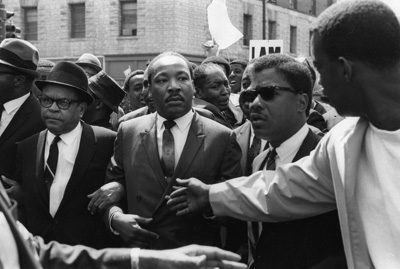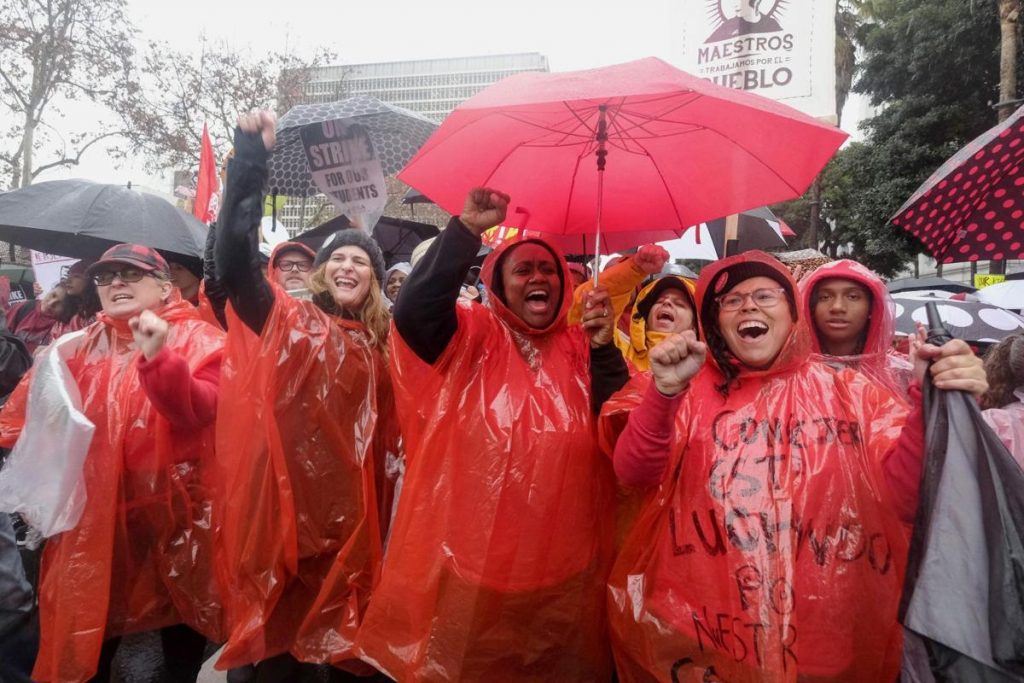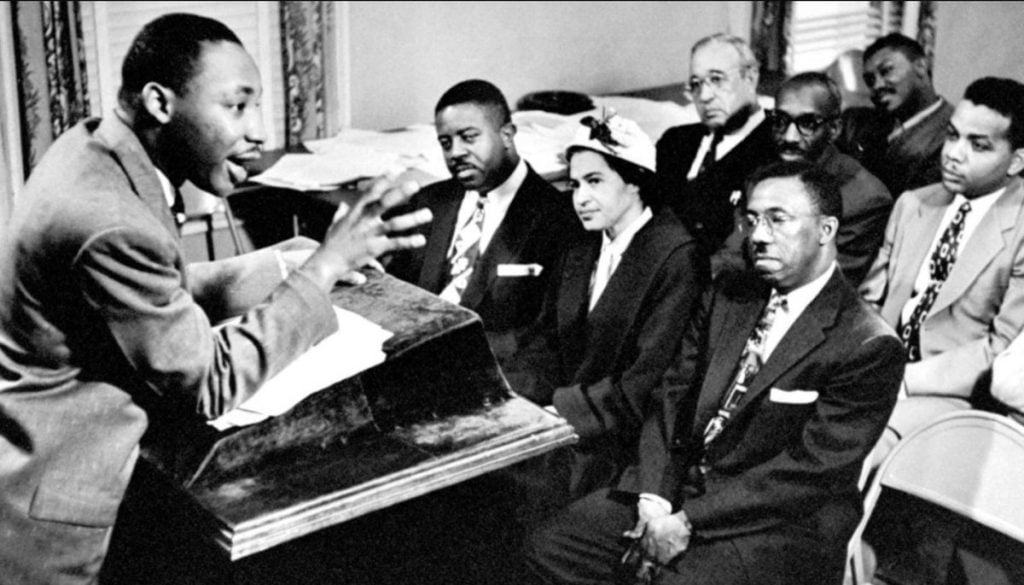Martin Luther King Commemorations Take Place Amid Government Shutdown and Worsening Capitalist Crisis
90th birthday of martyred Civil Rights and Peace leader illustrates continuing anti-people agenda emanating from Washington

Dr. Martin Luther King, Jr. was born on January 15, 1929 and grew into maturity in the Deep South city of Atlanta, Georgia during the Great Depression of the 1930s and early 1940s.
Therefore King witnessed firsthand the racism and poverty which was synonymous with the United States.
Although U.S. involvement in World War II brought the country out of an economic slump through the conversion of industrial facilities to war production while millions were drafted into military service, racism and national oppression against African Americans remained, both inside and outside of the armed forces. Hundreds of thousands of African Americans were subjected to a segregated military where many were harassed by racist officers, denied adequate services and accommodations, along with unjust court martial proceedings, detentions and even executions without due process.
African Americans were encouraged to play a role within the military in the fight against Imperial Japan and fascism in Europe by both the government of President Franklin D. Roosevelt and his supporters in the general population. Although Roosevelt’s New Deal programs in the first two terms of his administration provided assistance to displaced workers, distressed farmers and African Americans, there was never the passage of a federal Anti-Lynching Bill during this period of systematic racist terror. (See this)
The Fair Labor Standards Act of 1938 established the right to a minimum wage and overtime for toiling in excess of 40 hours per week. However, there were exceptions to this rule which remain well into the second decade of the 21st century, particularly for “tipped” employees in the so-called “hospitality” industry, where super-exploitation remains the order of the day.
King was admitted to the Historically Black College and University (HBCU) institution of Morehouse at the age of 15 in 1944. He would graduate four years later in 1948 at 19 years old. He attended graduate school at Crozer Theological Seminary in Pennsylvania and later earned a Ph.D in Systematic Theology from Boston University in 1955 when he was only 26.
The Rise of a People’s Movement for Civil Rights and National Liberation
In the post-war period of the late 1940s and early 1950s, the specter of the Cold War became dominant. The hostility towards the Soviet Union and the People’s Republic of China was coupled with attacks against the concepts of civil Rights and human rights. The National Liberation Movements sweeping Africa and Asia in the late 1940s and 1950s were seen by many within the U.S. ruling class as a major theater in Cold War politics. (See this)
This same notion was applicable to the struggle for civil rights and self-determination among African Americans. Roosevelt’s successor, President Harry S. Truman, commandeered the anti-communist hysteria while offering minor concessions in the areas of integrating the armed forces and token employment opportunities. Although Roosevelts’ widow Eleanor championed the passage of the Universal Declaration for Human Rights in 1948, she vigorously opposed the petition charging genocide against African Americans by the U.S. government which was submitted to the United Nations in 1951 by Paul Robeson, W.E.B. Du Bois and William L. Patterson. (See this)
After the 1954 Supreme Court decision declaring that separate but equal educational institutions were inherently unequal and unconstitutional along with the brutal murder of 14-year-old Emmett Till and hundreds of other African Americans in the post-War era, the social atmosphere was set for the rise of a mass Civil Rights Movement.
In Montgomery, Alabama while King pastored the Dexter Avenue Baptist Church, a boycott of the buses erupted in early December 1955, sparked by labor and civil rights activist Mrs. Rosa L. Parks, who refused to give up her seat to a white man. The boycott lasted for an entire year when the federal courts upheld the rights of African Americans to ride municipal buses with the same rights as whites. (See this)
The formation of the Southern Christian Leadership Conference (SCLC) in 1957, the birth of the Student Nonviolent Coordinating Committee (SNCC) in 1960 reinforced with the activities by the Congress of Racial Equality (CORE) and other organizations, sparked mass mobilizations, further successful legal challenges and the passage of additional civil rights legislation in 1957, 1964, 1965 and 1968. Yet these reforms were inadequate in calming the quest for full equality and liberation by African Americans. (See this)
With the advent of the Pentagon war against the Vietnamese people in the early to mid-1960s, the progressive African American organizations took position in opposition to the genocidal onslaught in Southeast Asia. SNCC came out publically against the war in early 1966 and SCLC would follow a year later. These developments along with the outbreak of urban rebellions in over 100 cities between 1962 and 1968 ushered in a period of revolutionary resistance which Dr. King was responding to at the time of his assassination in April 1968. King was in Memphis demonstrating in solidarity with striking African American sanitation workers seeking a contract and labor recognition when he was struck down. Many believe until this day that his death was a direct result of the repressive policies of the U.S. government seeking to crush the Black Liberation Movement of the 1960s. (See this)
King’s Legacy in the 21st Century
In 2019 people in the U.S. are facing monumental challenges with the longest federal government shutdown in history, the continuing rise in racism and gender-based violence, the threat of another recession due to overproduction, the imposition of tariffs and intensification of labor practices, which is leading to an ever widening gap between the rich and poor. The Pentagon budget which Dr. King and others vigorously attacked in the late 1960s has grown exponentially resulting in hundreds of military bases across the world and the active engagement of U.S. troops in many geo-political regions throughout Africa, Asia and Latin America.
As Dr. King realized after 1966, there is no fundamental political differences between the Democratic and Republican parties. Both entities represent the capitalist class which perpetuates national oppression, class divisions and imperialism around the world.
The assassination of Dr. King and a host of other African American leaders during the 1960s such as Medgar Evers, Malcolm X, Fred Hampton, the isolation and imprisonment of hundreds of others and the destruction of people’s organizations, had a tremendous impact in stifling the historical trajectory of the revolutionary struggle. Today there are over two million people incarcerated in the U.S. with millions of others under law enforcement and judicial supervision. By no means can such a scenario constitute a democratic society where the rights of the working class and oppressed are protected and advanced.
Yet the struggle continues on several fronts. There is the escalating intolerance towards institutional discrimination and racist violence from the state. Labor activists are demanding a fair and living wage in the most marginalized sectors of the proletariat. In Los Angeles, 32,000 educators went out on strike on January 14 demanding higher wages, smaller class sizes and the overall improvement of working conditions.
Los Angeles Teachers’ Strike on January 14, 2019
Nevertheless, there is the need for independent political organization and action which unites the workers and oppressed into a fighting revolutionary party. This party must advance the cause for a socialist society where the capitalist relations of production are overthrown and equality and self-determination becomes embedded in the character of the state.
Detroit will once again be a center for commemorations of Dr. King and the civil rights struggle drawing upon the actual social justice and antiwar legacy of the 1960s. The 16th Annual MLK Day Rally & March will be held outside of downtown this year in the North End section of a majority African American municipality which has been a focal point for failed neo-liberal policies on a domestic level resulting in massive dislocation through home foreclosures, water shutoffs, the destruction of public education and the impoverishment of the masses. (See this)
Martin Luther King, Jr. and Rosa Parks in Montgomery during bus boycott, January 1956
At St. Matthews & St. Joseph’s Episcopal Church beginning at Noon on Monday January 21, the federally-recognized holiday honoring Dr. King, labor and community activists will rally for a renewal of the struggle for liberation. The theme of the event will focus on the necessity to organize and mobilize the people for genuine equality and total freedom. Gail Walker, the executive director of the Inter-religious Foundation for Community Organization (IFCO) will be the keynote speaker.
This manifestation and others across the U.S. must serve as a rallying point to build a sustainable movement against the current administration along with the entire system of injustice and repression. Only the people united can bring about the change which is so desperately needed in the U.S. and across the planet.
*
Note to readers: please click the share buttons above. Forward this article to your email lists. Crosspost on your blog site, internet forums. etc.
All images in this article are from the author
Featured image: Martin Luther King Jr. leads final demonstration on March 28, 1968 in Memphis



